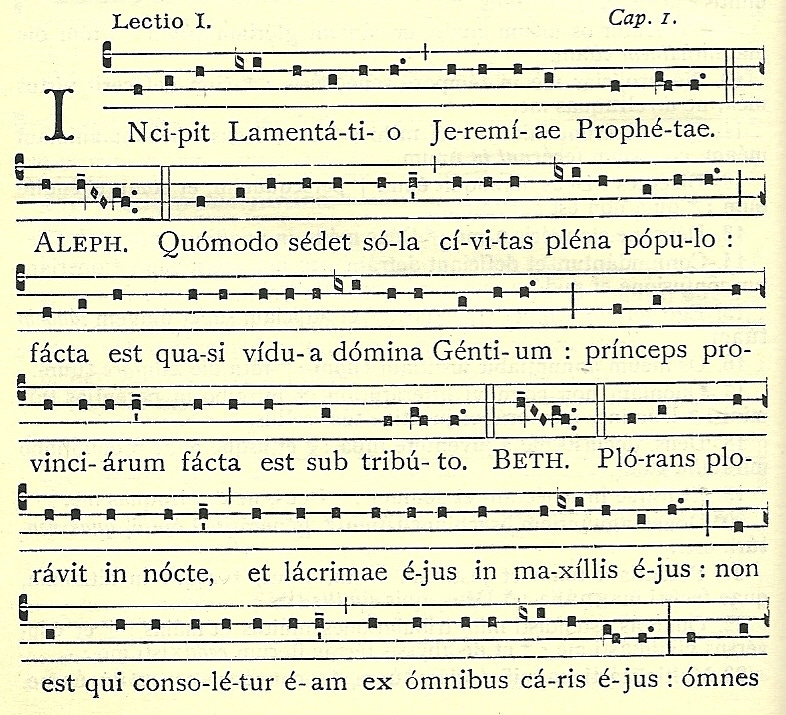For this Spy Wednesday of Holy Week, so called because “spy” originally meant an ambush or snare, I would like to reflect on the Lamentations of Jeremias the Prophet. These readings are used for Tenebrae, which today is often held only on Spy Wednesday but prior to the liturgical reforms of Pius XII, it involved the praying of matins and lauds for Maundy Thursday, Good Friday and Holy Saturday in anticipation on the evening of the previous day, thus beginning on Spy Wednesday. Each verse in the Vulgate included a Hebrew heading, which are sometimes retained in musical settings.
During this liturgical service, candles on a special type of candelabra called a hearse (with appropriate funerary connotations) were gradually extinguished, one for each of the nine psalms of matins and the five pslams of lauds, while the six altar candles were also extinguished as the Benedictus was prayed until the whole church was in darkness save for the last candle on the hearse, which would be hidden in a candle lantern. Then, the participants would hear a loud noise - the strepitus - symbolizing the earthquake that followed Christ’s death and signaling them to depart. The last candle is shown to the people, then finally extinguished and placed on a “credence table” as the people leave the church.
This profoundly beautiful ceremony was sadly removed from its ancient anticipatory setting to the morning of in the reforms of Pius XII, losing the large lay participation and great tradition of musical accompaniment involved in Tenebrae, and in the new rite of 1970, Tenebrae was no longer mentioned in the Roman Breviary and is now prayed in varying forms often only on Spy Wednesday.
The original form of Tenebrae offers a poignant meditation on the historic events of this day and the entirety of Holy Week. To all appearances, the world was cast in darkness: Judas, a hand-picked disciple of Christ, betrayed him, and at his treason - after he received the Eucharist - he was possessed by Satan. (Jn 13:27) One of the archetypes for all bishops and priests in history succumbed to temptation and forfeited his divine mandate to shepherd God’s people. This is a powerful reminder for us today that any Christian can fall, even those in the hierarchy of the Church, but also a lesson in God’s indomitable faithfulness. As J.R.R. Tolkien wrote,
For like a shaft, clear and cold, the thought pierced him that in the end the Shadow was only a small and passing thing: there was light and high beauty for ever beyond its reach.1
English translation of lyrics:
[1] Aleph. How doth the city sit solitary that was full of people! how is the mistress of the Gentiles become as a widow: the princes of provinces made tributary!
[2] Beth. Weeping she hath wept in the night, and her tears are on her cheeks: there is none to comfort her among all them that were dear to her: all her friends have despised her, and are become her enemies.
[3] Ghimel. Juda hath removed her dwelling place because of her affliction, and the greatness of her bondage: she hath dwelt among the nations, and she hath found no rest: all her persecutors have taken her in the midst of straits.
[4] Daleth. The ways of Sion mourn, because there are none that come to the solemn feast: all her gates are broken down: her priests sigh: her virgins are in affliction, and she is oppressed with bitterness.
[5] He. Her adversaries are become her lords, her enemies are enriched: because the Lord hath spoken against her for the multitude of her iniquities: her children are led into captivity: before the face of the oppressor.
(Cover image source: Tenebrae hearse, Antoni Gaudi, Sagra Familia basilica: By Didier Descouens - Own work, CC BY-SA 4.0, https://commons.wikimedia.org/w/index.php?curid=127791916)
J.R.R. Tolkien, The Lord of the Rings (Mariner Books, 2004), 922. Kindle.





Some monastic communities still carry some of the old practices of Holy Week and I was fortunate enough to participate in them many years ago in thwt context. The Lamentations are a particular favourite of mine. I go to the ICKSP and they still do the Tenebrae, albeit in the morning and I cannot get there at that time. So this afternoon I prayed the first ones, for the first time in years. A tradition well worth maintaining.
I think it would be wise for all of us to stop automatically calling every change a “reform,” a word which usually carries positive connotations, as in the liturgical “reforms” of Pius XII. Just call change by its basic name, then make it clear whether you think it a good one, or leave that for the reader to decide.